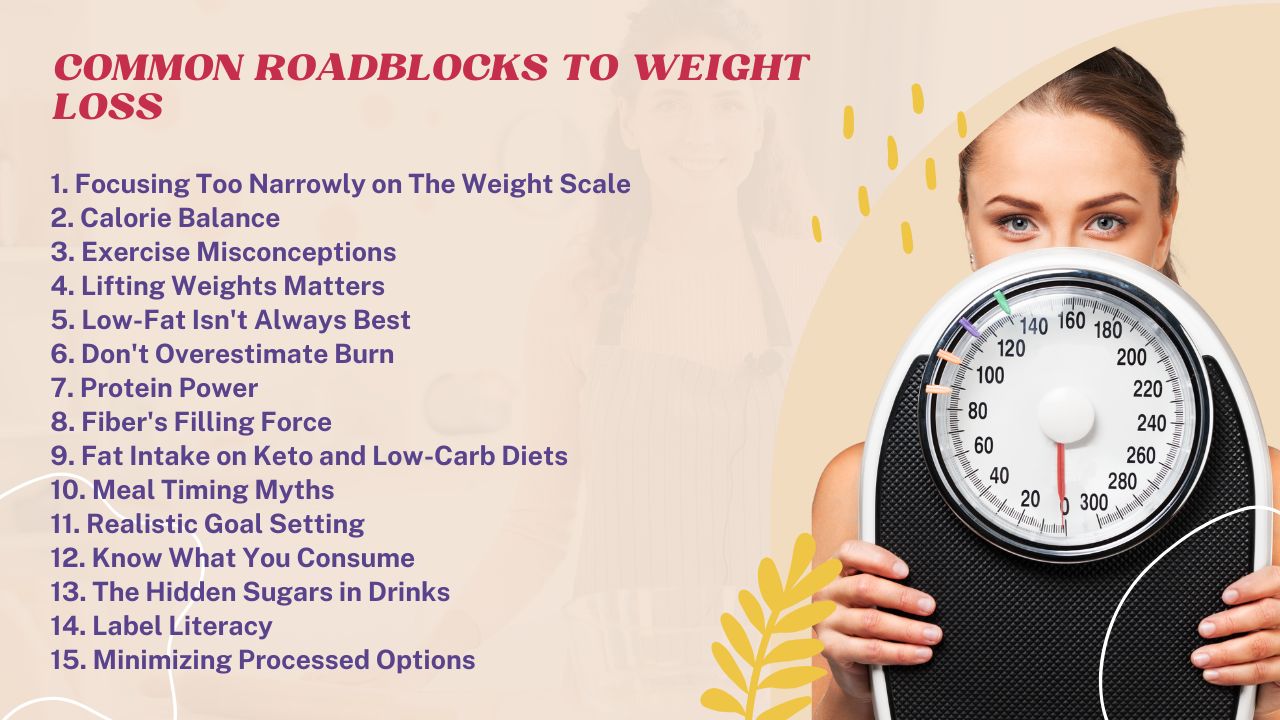Common Mistakes That Stall Your Weight Loss

It can be tough for some people to shed those extra kilos. You might be putting in the effort with healthy habits but still not seeing the scale budge.
It’s possible that you’re following advice that isn’t quite right or is a bit old-fashioned, and that could be holding you back from reaching your goals.
Common Roadblocks To Weight Loss

- Focusing Too Narrowly on The Weight Scale
Don’t let the scale be your only guide. Weight fluctuates because of fluid shifts, digestion, and hormonal changes. You might be losing fat and gaining muscle, leading to inches lost even if the number stays the same. Track progress with measurements and photos.
- Calorie Balance
A calorie deficit is important, but the ideal amount varies. People often misjudge the calorie intake in meals and overestimate exercise burn. Healthy but calorie-dense foods like nuts require portion control. Severely restricting calories can backfire, causing muscle loss and a slower metabolism.
- Exercise Misconceptions
Skipping exercise during calorie restriction leads to more muscle loss and a lower metabolism. Exercise helps preserve muscle, boost fat loss, and maintain metabolic rate. However, excessive exercise is unsustainable, stressful, and can disrupt hormones. Go for a balanced approach with cardio as well as strength training.
- Lifting Weights Matters
Weightlifting is a potent tool for weight loss. It builds muscle, increases metabolism, improves strength, and can target belly fat. Combining it with aerobic exercise appears to be the most effective fat-loss strategy.
- Low-Fat Isn’t Always Best
Processed low-fat foods often compensate for fat reduction with added sugar to enhance taste. This can lead to higher overall sugar intake and increased hunger, potentially causing you to eat more. Opt for low-fat, nutrient-rich whole foods that are naturally available.
- Don’t Overestimate Burn
While exercise boosts metabolism, the calorie burn is often overestimated. People often overreport their activity levels. Understand your actual exercise output for a more accurate picture.
- Protein Power
Adequate protein intake is important for weight loss. It reduces appetite, increases fullness, helps prevent weight regain, and preserves muscle mass while boosting metabolism. Include a protein source in every meal.
- Fiber’s Filling Force
A low-fiber diet can restrict weight loss. Viscous fiber creates a gel that promotes fullness and slows digestion. All types of fiber contribute to weight management and may positively impact gut health.
- Fat Intake on Keto and Low-Carb Diets
Low-carb and ketogenic diets can be effective by suppressing appetite. However, unlimited fat intake can lead to excess calories if you don’t experience strong satiety signals. Monitor and potentially reduce fat intake if weight loss stalls.
- Meal Timing Myths
The idea of eating frequently to boost metabolism might lead to overconsumption and a lack of true fullness. Eating two to three meals a day may be beneficial. Don’t force breakfast if you’re not hungry; focus on eating when your body signals the need.
- Realistic Goal Setting
Unrealistic weight loss expectations can lead to discouragement. Keep practical goals like a 5-10% weight reduction at a steady pace of 1-2 kilos per week for sustainable and healthy progress.
- Know What You Consume
Even with healthy food choices, you might be overeating or missing key nutrients. Tracking your food intake provides an accurate view of your calorie and nutrient consumption, promoting accountability and better choices.
- The Hidden Sugars in Drinks
Cutting out sugary sodas is beneficial, but fruit juice isn’t a healthy substitute. Even 100% fruit juice is high in sugar. Liquid calories don’t trigger the same satiety signals that solid food does, potentially leading to higher overall calorie intake.
- Label Literacy
Overlooking or misinterpreting food labels can lead to unwanted calories and unhealthy ingredients. Front-of-package claims can be misleading. Always check the ingredient list and nutrition facts on the back for complete information.
- Minimizing Processed Options
A diet high in processed foods can restrict weight loss and contribute to health problems. Whole, single-ingredient foods are often more filling and harder to overeat compared to highly palatable processed options. Prioritize minimally processed choices.
